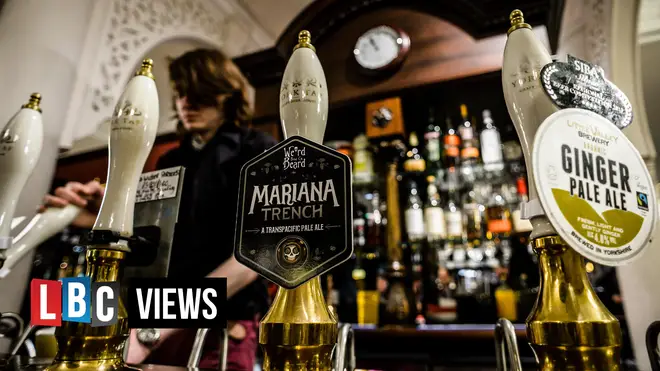
Nick Abbot 10pm - 1am
25 January 2024, 09:53 | Updated: 25 January 2024, 10:17

Another day, another civil liberty casually cast aside in service of some greater good imagined by the powers-that-be.
The latest affront comes from the Home Office, who are weighing up plans to empower pubs, bars, and off-licences to use facial recognition and fingerprinting to verify a patron's age before serving them alcohol.
As someone who occasionally enjoys popping 'round the local for a pint, this overt invasion of privacy and erosion of civil liberties sends a chill down my spine.
It wasn't so long ago that simply showing your passport or driving licence was sufficient to pass this test. But in their insatiable quest for more data and control, the government has now set their sights on some of the most sensitive personal information out there - our very faces and fingerprints.
And let us not forget the grave dangers of requiring fingerprints just for a trip down the pub.
Make no mistake — any fingerprint data collected will inevitably end up in massive databases under the control of the government, or even worse some outside contractor.
All in the name of "public safety", these databases may then be used for advanced surveillance and monitoring of perfectly legal behaviour like purchasing alcohol.
In fact, some overeager bureaucrats are probably already dreaming up ways to utilise this trove of fingerprint data. Could the NHS one day access the database to identify and target those deemed to drink excessively?
Might such databases be used to impose stricter alcohol purchase limits or deny service to those flagged as "risky" drinkers by some algorithm?
And could law enforcement use the database for general monitoring and profiling without a warrant? The potential for abuse is enormous.
How long will it be before some arms-length NHS body is sending you warning texts because you have bought too many bottles of hipster craft IPA, and then had the audacity to buy a bottle of wine too (the database doesn't know you are off to a family party).
I can see texts now, from the authoritarian-sounding 'NHS MONITORING' telling me I have consumed - "TOO MANY UNITS." Will we end up being sent to mandatory detox?
But, seriously, handing over our sensitive biometric data in order to enjoy a pint or glass of wine opens the door to a dystopian future where government databases track our most minute behaviours.
First, it's tracking alcohol purchases, and next it's tracking everything else we do.
This cannot stand in a free society — it is time to halt mission creep towards a surveillance state before it's too late.
Make no mistake - this slope is slippery. Once such invasive biometrics become normalised at the neighbourhood pub, it paves the way for even more surveillance in other facets of life.
Perhaps before we can open a bank account, rent a flat, or access government services, we'll be asked to scan our faces and fingertips first. A bleak Orwellian future indeed.
And why is all this being considered? To stamp out underage drinking, yet Gen-Z drink on average 20% less than millennials, who also drink less than the previous generation, mainly because of an increased awareness of the dangers and effects of alcohol and the rise of health-consciousness as a lifestyle.
We must guard against normalising surveillance and biometric collection lest we wake up one day with no privacy and autonomy left.
Consider this my vigilant alarm call against marching further down an authoritarian path all in the name of safety and public health.
They may come for our pints of bitter first, but they won't stop there if we don't speak up now.
LBC Views provides a platform for diverse opinions on current affairs and matters of public interest. The views expressed are those of the authors and do not necessarily reflect the official LBC position.
To contact us email views@lbc.co.uk